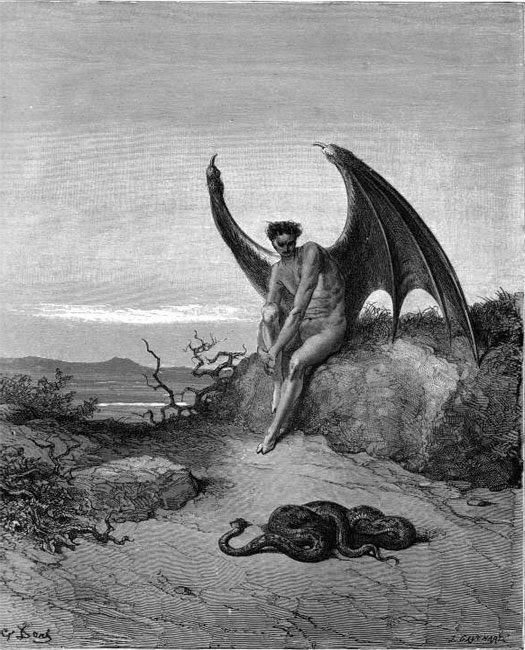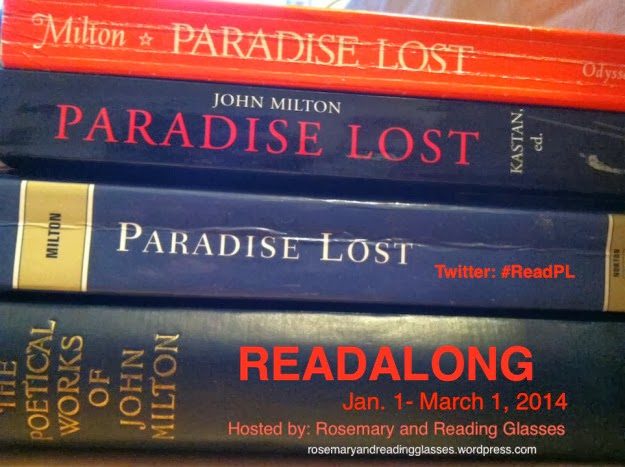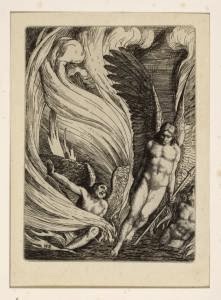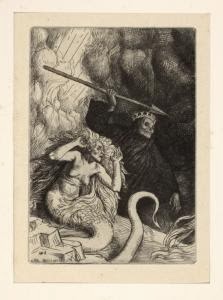The poet changes images from scenes of harmony to
“tragic, foul distrust, and breach disloyal on the part of man, revolt and disobedience ……” and makes a reference to a
“celestial patroness” who visits him at night to inspire him to verse, as he is perhaps too old to have the words come to him without divine help.
Meanwhile Satan rises with the mist in the Garden and finds the perfect creature to inhabit for his deception; the snake, who is crafty and can easily move around without arousing suspicion. Again he railing his discontent and spewing evil:
“………. and the more I see
Pleasures about me, so much more I feel
Torment within me, as from the hateful siege
Of contraries; all good to me becomes
Bane, and in Heaven much worse would be my state.” (119 – 123)
“For only in destroying do I find ease
To my relentless thoughts……..” (129 – 130)
Still he wishes to best God in any way possible, boasting that he will tarnish creation in less time than it took the Almighty to create it:
“In woe then, that destruction wide may range:
To me shall be the glory sole among
The Infernal Powers, in one day to have marred
What he, Almighty styled, six nights and days
Continued making, and who knows how long
Before had been contriving? …….” (134 – 139)
Then “in at his mouth The Devil entered” the serpent and waited until morning.
Adam and Eve wake, but when it is time to perform their duties in the garden, curiously Eve suggests that they part and each work separately, thus accomplishing more work.
“For, while so near each other thus all day
Our task we choose, what wonder if so near
Looks intervene and smiles, or object new
Casual discourse draw on, which intermits
Our day’s work, brought to little, though begun
Early, and the hour of supper comes unearned.” (220 – 225)
Adam cautions his spouse that they have been warned that there is evil lurking in the Garden and they would be safer if they remained united, but Eve relates her hurt at his mistrust of her judgement. Yet still Adam persists:
“But God left free the Will; for what obeys,
Reason is free, and Reason he made right,
But bid her well beware, and still erect,
Lest, by some fair appearing good surprised,
She dictate false, and misinform the Will
To do what God expressly hath forbid.
Not then mistrust, but tender love, enjoins
That I should mind thee oft; and mind thou me.” (351 – 358)
Stubbornly resistant, Eve states that she is going alone with his permission and warning, confident that a proud foe would not seek the weaker victim, and “thus saying, from her husband’s hand her hand soft she withdrew …..”
Satan in the guise of the Serpent, finds Eve and is initially disarmed:
“Her graceful innocence, her every air
Of gesture or least action, overawed
His malice, and with rapine sweet bereaved
His fierceness of the fierce intent is brought.
That pace the Evil One abstracted stood
From his own evil, and for the time remained
Stupidly good, of enmity disarmed,
Of guile, of hate, of envy, of revenge.” (459 – 466)
But not for long:
“But the hot hell that always in him burns,
Though in mid Heaven, soon ended his delight,
And tortures him now more the more he sees
Of pleasure not for him ordained: then soon
Fierce hate he recollects, and all this thoughts
Of mischief, gratulating, thus excites: …….” (467 – 472)
Astounded at the Serpent’s ability of speech, Eve ponders what this could mean, but when Satan commends her beauty and appeals to her vanity, she readily accepts his story that he gained speech and wisdom by eating from the Forbidden Tree. Immediately she sees herself gaining stature until she is above Adam. Of course, she would not actually die, but simply die to being Human, while becoming a god herself. And the Serpent ate of the tree and he still retains life. And so:
“Forth-reaching to the fruit, she plucked, she eat;
Earth felt the wound, and Nature from her seat;
Sighing through all her works, gave signs of woe
That all was lost …………” (781 – 784)
Immediately she wonders if she should share the knowledge/fruit with Adam or keep it all to herself. But thinking that she may actually die for her transgression and jealous of the possibility of Adam marrying again, she chooses to take it to her partner so he will share her same fate, whatever that might be.
Adam, when she tells him of her actions, is horrified:
“………. Adam, soon as he heard
The fatal trespass done by Eve, amazed
Astonied, stood and blank, while horror chill
Ran through his veins, and all his joints relaxed.
From his slack hand the garland wreathed for Eve
Down dropped, and all the faded roses shed.” (888 – 893)
What an effective image! Adam had brought a wreath of flowers to Eve, expecting to crown his Queen and he is met by a creature “defaced, deflowered and now to death devote!”. Distraught, he contemplates the implications of obeying God’s command, but decides he cannot live without his partner. With Eve’s coaxing, he eats of the fruit. Immediately inflamed and drunk with lustful desire, they retire into the woods for sexual play and later sleep overcomes them. Yet they wake:
“As from unrest, and, each the other viewing,
Soon found their eyes how opened, and their minds
How darkened; innocence, that as a veil
Had shadowed them from knowing ill, was gone;
Just confidence, and native righteousness,
And honour, from about them, naked left
To guilty shame ……” (1051 – 1057)
They have gained knowledge, but it is the knowledge of the good they have lost and the evil that they have gained. Each blames the other for their transgression, bickering for hours on end as to who is culpable.
 |
Satan finds snake to inhabit
by Gustave Doré (1866) |
Book X
The Angels hear of Adam and Eve’s grievous sin, and are filled with sorrow and compassion. Returning to Heaven, God holds them blameless:
“I told ye then he should prevail, and speed
On his bad errand —- Man should be seduced
And flattered out of all, believing lies
Against his Maker, no decree of mine
Concurring to necessitate his fall,
Or touch with lightest moment of impulse
His free will, to her own inclining left
In even scale………” (40 – 47)
God visits Adam and Eve in the Garden, where they confess their sin and he asks Adam, “was she thy God, that her thou didst obey before his voice?” He pronounces judgement on the pair, yet with judgement comes mercy as the Son:
” …… pitying how they stood
Before him naked to the air, that now
Must suffer change, disdained not to begin
Thenceforth the form of servant to assume,
As when he washed his servants’ feet so now,
As father of his family, he clad
Their nakedness ……….” (211 – 217)
Meanwhile, Sin and Death are at the gates of Hell and “found a path over this main from Hell to that new World where Satan now prevails ….”. Meeting Satan on their way their congratulate him on his victory, and he tells them:
“All yours, right down to Paradise descend;
There dwell, and reign in bliss; thence on the Earth
Dominion exercise and in the air
Chiefly on Man, sole lord of all declared;
Him first make sure your thrall, and lastly kill ….” (398 – 403)
When Satan arrives in Pandemonium and relates his Triumph, he expects “their universal shout and high applause to fill his ear, when contrary, he hears, on all sides, from innumerable tongues a dismal universal hiss, the sound of public scorn ……”, then “His visage drawn he felt to sharp and spare, his arms clung to his ribs, his legs entwining each other, till supplanted, down he fell, a monstrous serpent on his belly prone …..” His followers experience the same phenomenon and, “thus was the applause they meant turned to exploding hiss, triumph to shame…” A tree grows in Hell similar to the Tree of Knowledge but when they try to eat the fruit, it turns to ash in their mouths.
Sin and Death begin to move through the world. In Heaven, God instructs the angels to change the universe, causing cold and hot climates, producing winds, thunder and snow and various other effects that alter the paradisiacal conditions of the Earth. Adam, hiding in the gloomy shade, laments his miseries and when Eve comes to comfort him he replies:
“Out of my sight, thou serpent; that name best
Befits thee with him leagued thyself as false
And hateful: nothing wants, but that thy shape
Like his, and colour serpentine, may show
Thy inward fraud, to warn all creatures from thee.” (866 – 871)
He berates her, laying all the blame for their condition at her feet but, instead of acting with like animosity, she responds with a wonderful contriteness, asking for his forgiveness and fully accepting blame. She suggests that if Death does not find them, they should seek him out themselves. Her humbleness and lack of pride have a surprising affect on Adam. Claiming God’s punishment just, he encourages her to accept their fate and go forward with hope. Some of the punishments they have so far experienced (ie. childbirth) have brought forth joy as well as pain and that is a comfort.
“No more mentioned, then, of violence
Against ourselves, and wilful barrenness,
That cuts us off from hope, and savours only
Rancour and pride, impatience and despite,
Reluctance against God and his just yoke
Laid on our necks……..” (1041 – 1046)
“What better can we do than, to place
Repairing where he judged us, prostrate fall
Before him reverent, and there confess
Humbly our faults, and pardon beg, with tears
Watering the ground, and with our sighs the air
Frequenting, sent from hearts contrite, in sign
Of sorrow unfeigned and humiliation meek?
Undoubtedly he will relent, and turn
From his displeasure, in whose look serene
When angry most he seemed and most severe
What else but favour, grace, and mercy shone?” (1086 – 1096)
Thoughts:
Wow! There was so much information, action and images packed into these two books, particularly book IX.
At the beginning of book IX, Milton mentions his celestial patroness or Muse, telling of her impartations of inspired verse and that he is not skilled enough on his own to create such poetic display. There are certain scholars who feel that Milton’s brilliance is not as apparent in the latter parts of the poem as the beginning (I am not noticing this, but, of course, I’m not a scholar), so I wondered if he is setting up this humble claim as a reason for a decrease in poetical ability……??
Again Satan’s torment is palpable and his personification of deception alarming. Occasionally he still feels joy, peace, happiness and knows what they mean, yet with any positive emotion felt, his rage, self-loathing and malice return at even greater strength.
I had to wonder while I was reading this, whether Adam and Eve were familiar with deception. They would have had no exposure to it, but God did mention that they were completely equipped to meet their deceiver. I imagine, that while Adam and Eve had a certain sense of wonder and innocence, that they were not created as children. They were created as full-grown beings with sense and reason. It was their free-will that gave them the right to choose, and they made an horrendous mistake.
I had to shudder at the speech Satan gave his minions. Once again, he is only concerned with power and prestige: “Thrones, Dominations, Princedoms, Virtues, Powers —“. He gives the image of an army: “a broad way is now paved, to expedite your glorious march” and says that man’s disgrace is “worth their laughter”. Chilling.
The most poignant lines of the poem:
“O much deceived, much failing, hapless Eve,
Of thy presumed return! event perverse!
Thou never from that hour in Paradise
Found’st either sweet repast or sound repose;
Such ambush, hid among sweet flowers and shades,
Waited, with hellish rancour imminent,
To intercept thy way, or send thee back
Despoiled of innocence, of faith, of bliss.” (404 – 411)
And whomever has read through this whole post, deserves some type of award!!! 🙂












.jpg!xlMedium.jpg)











